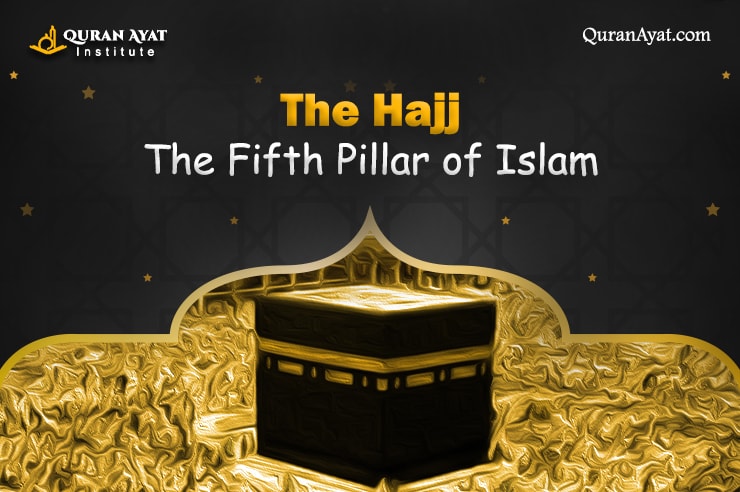Among the 5 pillars of Islam that the religion is established on, is Hajj, the pilgrimage to Mecca. This great worship that every Muslim has to perform at least once in a lifetime.
In this article, we’ll learn what is Hajj, its importance, how to perform Hajj correctly, and the difference between Hajj and Umrah.
What is The Fifth Pillar of Islam?
Hajj (The Pilgrimage to Mecca) is the fifth & last pillar of Islam. It’s very special worship that requires Muslims to travel to the holy city of Mecca in Saudi Arabia at a certain time in the year to perform certain rituals.
“Hajj” comes from the Arabic word “حَجّ” which linguistically means “heading to a place for the sake of visiting”. In Islamic terminology, Hajj is a pilgrimage made to the Kaaba, the “House of Allah”, in the sacred city of Mecca in Saudi Arabia.
The pilgrimage to Mecca is obligatory at least once in a lifetime for all adult Muslims who are physically and financially capable and can support their family during their absence.
The rituals of Hajj are performed over 5 or 6 days depending on the lunar Islamic calendar. The season of pilgrimage begins every year on the 8th day and ending on the 13th day of Dhu al-Hijjah, the last month of the Islamic calendar.
In Hajj, Hujjaj (Pilgrims) make Ihram and perform a series of rituals: each Muslim walks counter-clockwise seven times around the Kaaba (a cube-shaped building and the direction of prayer for Muslims), trot (walks briskly) back and forth between the hills of Safa and Marwah seven times, then drinks from the Zamzam Well, goes to the plains of Mount Arafat to stand in vigil, spends a night in the plain of Muzdalifa, and performs symbolic stoning of the devil by throwing stones.
Importance & Benefits of Hajj (The Pilgrimage to Mecca)
The importance of performing Hajj is immense as one of the five pillars that Islam is established. It makes Muslims feel their true role in this life which is worshiping Allah (SWT). It also reminds Muslims of Ibraheem (Peace upon him) and his worship and devotion to Allah (SWT) – so Muslims do the same. Not to mention bringing the international community of Muslims together.
Actually, the benefits of Hajj (The Pilgrimage to Mecca) are so many and diverse, such as:
- Hajj Teaches Patience, Self-Restraint, and Endurance
The Hajj journey might involve long and tiring travel. The rituals themselves may be strenuous, particularly during Makkah’s hot summers and amid crowds of other pilgrims. As a result, Muslims learn patience and to stay strong even when experiencing temptation or tiredness. - Touristic & Historical Journey
The Pilgrimage to Mecca, Besides being a great spiritual & religious journey, It’s a great opportunity to visit places where historical and religiously significant events took place. For example, you can pay your respects at the cemetery of Jannat Al Mu’alla, where some of the Prophet (PBUH)’s ancestors were buried. Museums in Makkah include the Kiswa Factory, where the Kaaba cover is crafted each year. - Absolution from Sins
The sins of a believer whose Hajj has been accepted are wiped entirely. In this regard, the prophet Muhammad (PBUH) said: “Whoever performs Hajj and does not commit any Rafath (obscenity) or Fusooq (transgression), he returns (free from sin) as the day his mother bore him”. – [Sahih-al-Bukhari] - A Sort of Jihad
Hajj is a kind of jihad for the sake of Allah; hence Allah mentions it after the verses of jihad. Also, in Hadith, when ‘Aa’ishah (may Allah be pleased with her) asked the Prophet Muhammad (PBUH) whether jihad is obligatory for women, he said: “Yes, for them there is a jihad in which there is no fighting, Hajj and ‘Umrah.” - The Reward for Hajj is Jannah
It is, however, promised by Almighty Allah that who perform Hajj with purest of heart will get the reward of paradise. in this regards, the prophet Muhammad said: “From one ‘Umrah to another is the expiation for what is between them and Hajj Mabrûr has no reward except Paradise.” – [Bukhari and Muslim]
Mentions of Hajj in Quran & Hadtih
Due to the importance of Hajj (The Pilgrimage to Mecca), it was mentioned many times in the Quran & Hadith.
Mentions of Hajj in The Quran
And proclaim to mankind the Hajj (pilgrimage). They will come to you on foot and on every lean camel, they will come from every deep and distant (wide) mountain highway (to perform Hajj).
The Holy Quran [22:27]
And [mention] when We made the House a place of return for the people and [a place of] security. And take, [O believers], from the standing place of Abraham a place of prayer. And We charged Abraham and Ishmael, [saying], “Purify My House for those who perform Tawaf and those who are staying [there] for worship and those who bow and prostrate [in prayer].”
The Holy Quran [2:125]
Indeed, as-Safa and al-Marwah are among the symbols of Allah. So whoever makes Hajj to the House or performs ‘umrah – there is no blame upon him for walking between them. And whoever volunteers good – then indeed, Allah is appreciative and Knowing.
The Holy Quran [2:158]
Mentions of Hajj in Hadith
O people! Hajj (pilgrimage to the House of Allah) has been made incumbent upon you, so perform Hajj.
Hadith [Book 10, Hadith 2]
No good deeds done on other days are superior to those done on these (first ten days of Dhul Hijja).
Hadith [Book 13, Hadith 18]
How to Perform Hajj Step-by-Step (with Video)
Steps List of Hajj
- Preparation and Intention
- Enter the state of Ihram
- Tawaf x7
- Safa and Marwa
- Clip/Shave Hair (Umrah ends)
- Resting and Praying
- Enter the state of Ihram
- Arrive at Mina
- Day of Arafah
- Muzdalifah (under the night sky)
- Rami (stoning of the devil)
- Qurbani
- Shave Head
- Tawaf al-Ifadha
- Rami (stoning of the devil)
- Spend the night at Mina
- Rami (stoning of the devil)
- Farewell Tawaf al-Wida

Difference Between Hajj and Umrah (with Video)
The major difference between Hajj and Umrah stated in timing, physical toil, and intention…
Hajj is the fifth pillar of Islam, and it is mandatory for everyone who is physically and financially able to perform it once in a lifetime. `Umrah is not a pillar of Islam and it is only recommended and not obligatory.
Hajj must be performed in the prescribed time period, namely the months of Hajj, and even more specifically, the major rites are done in the first two weeks of Dhul- Hijjah. `Umrah, however, can be done at any time of the year.
Umrah involves only the rites of Tawaf and Sai with ihram; whereas Hajj involves staying in Mina, performing the rite of wuquf (standing) in the plains of Arafat, staying in Muzdalifah, and pelting the stone pillars, as well as sacrifice in some cases. Umrah, however, does not involve any of these.
What Are The Other Pillars of Islam?
As you may know, there are 5 pillars of Islam. Besides “Hajj”, the other 4 pillars of Islam are:
- The Shahadah (The Profession of Faith)
- Salah (Daily Prayer)
- Zakat (Almsgiving/Charity)
- Sawm (Fasting during Ramadan)




